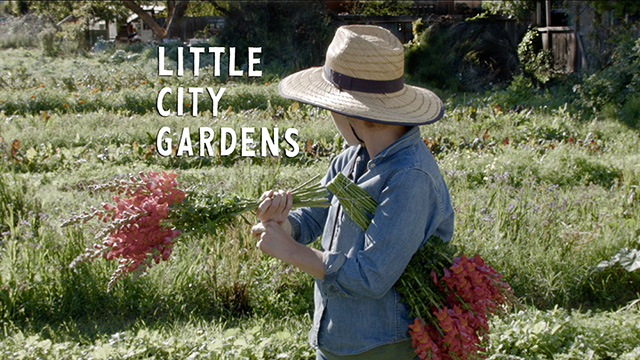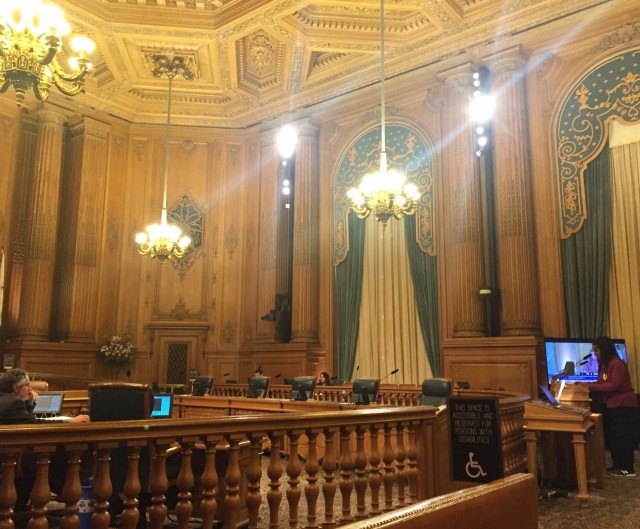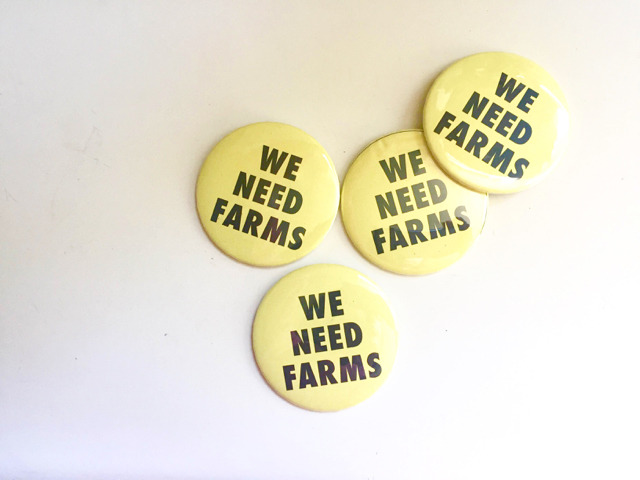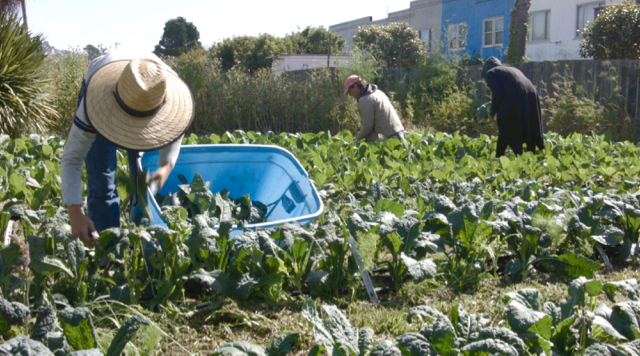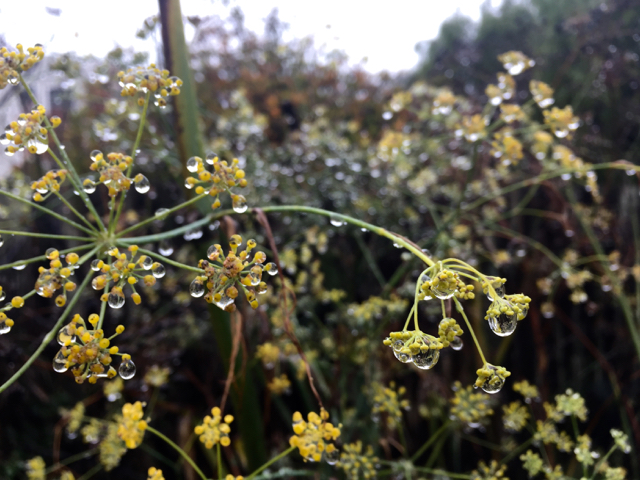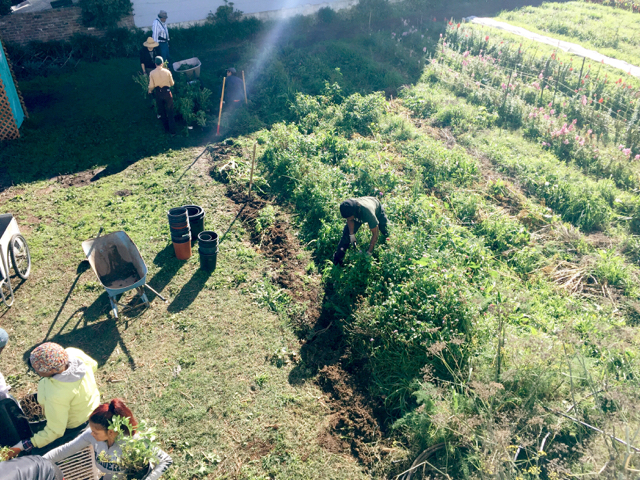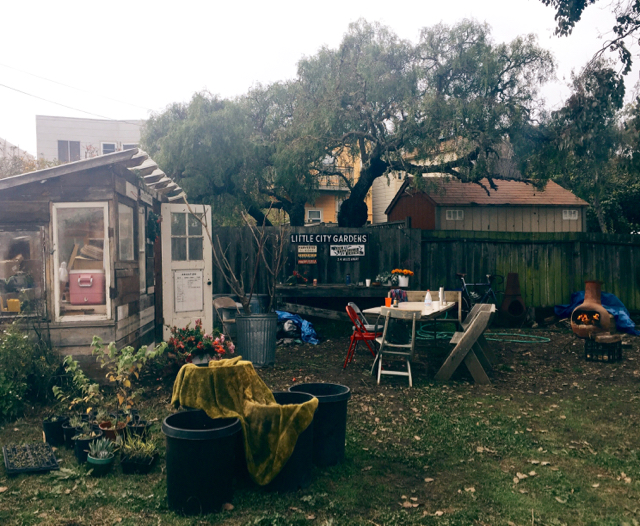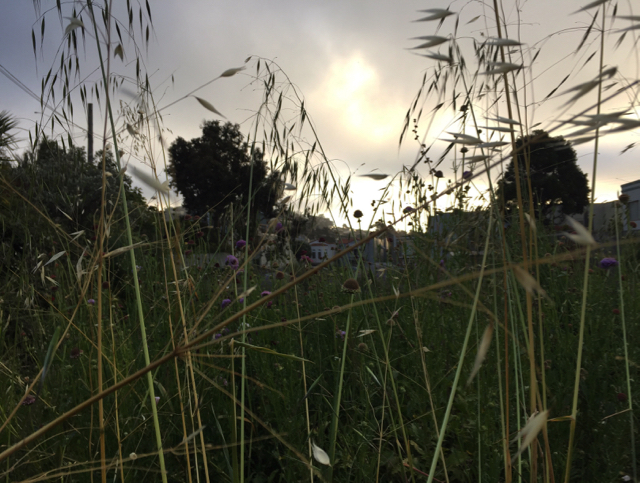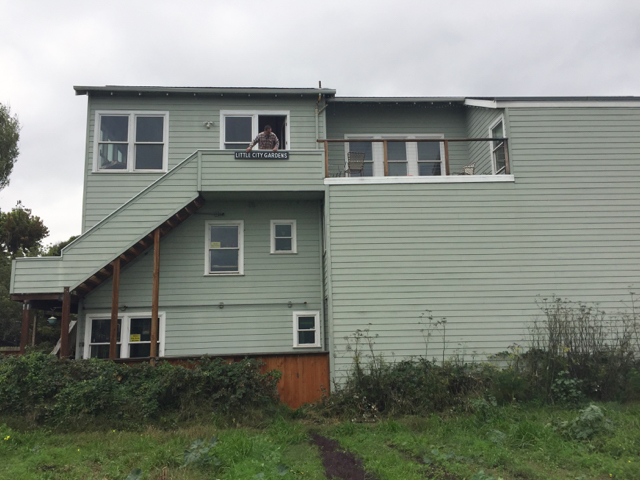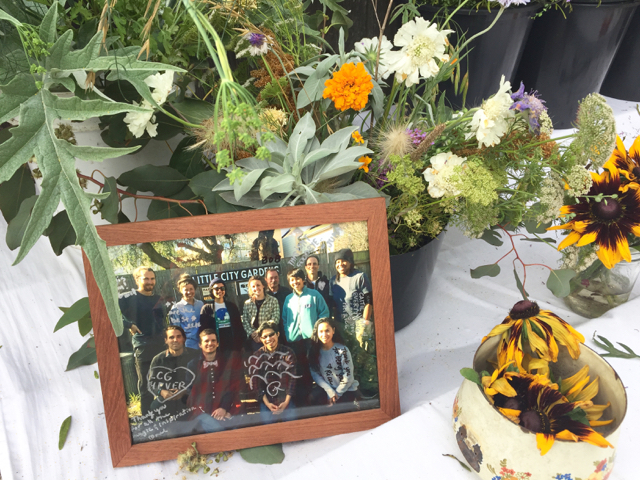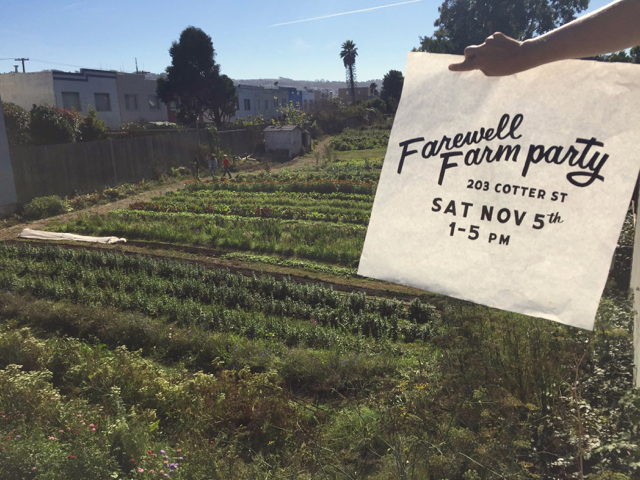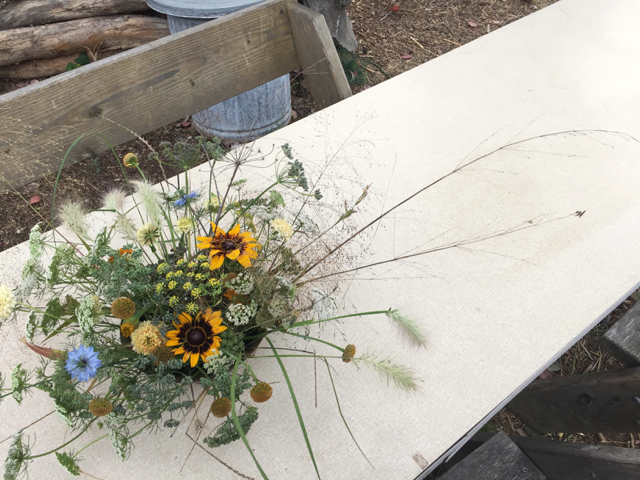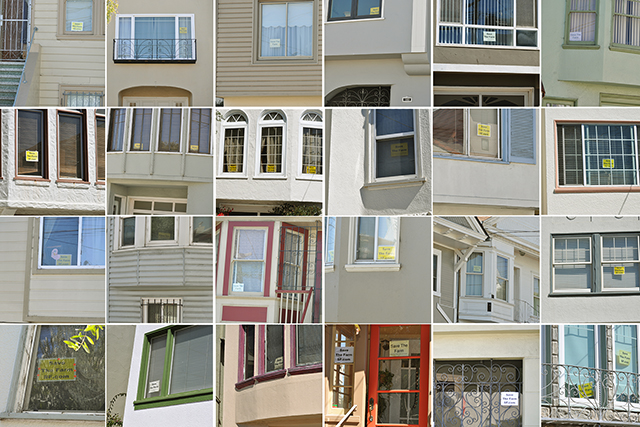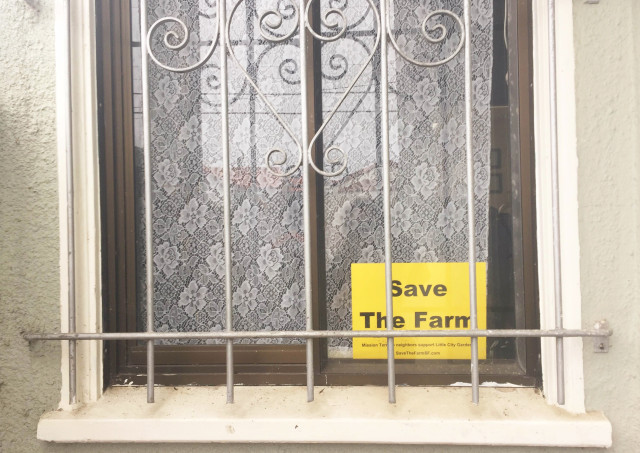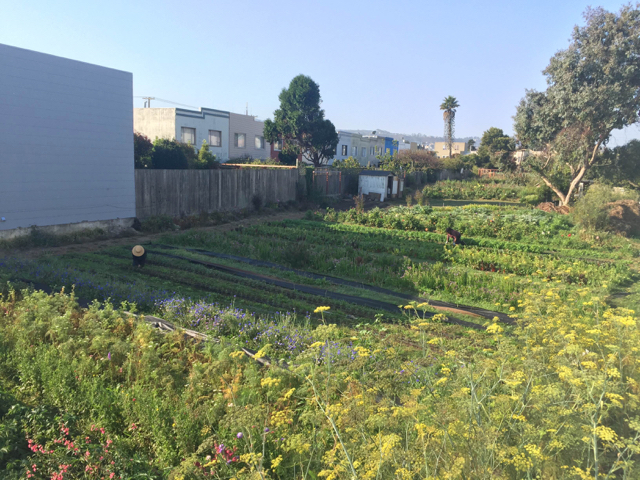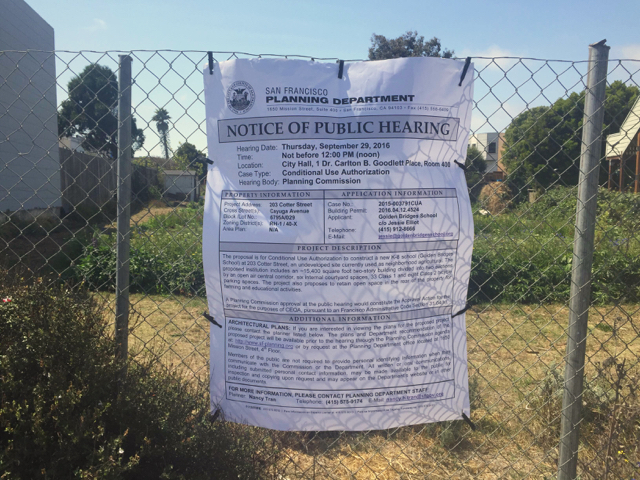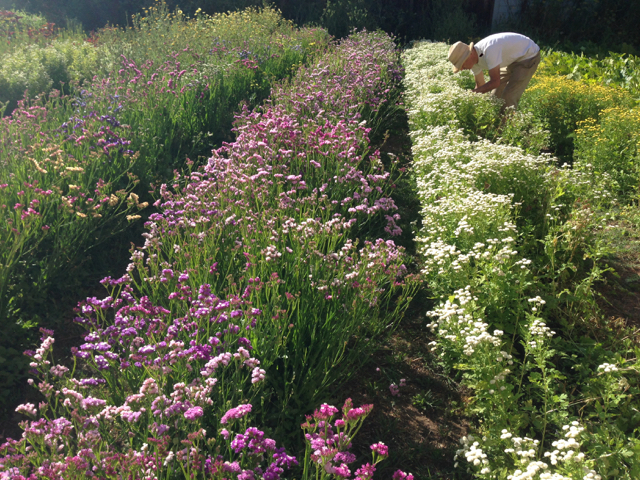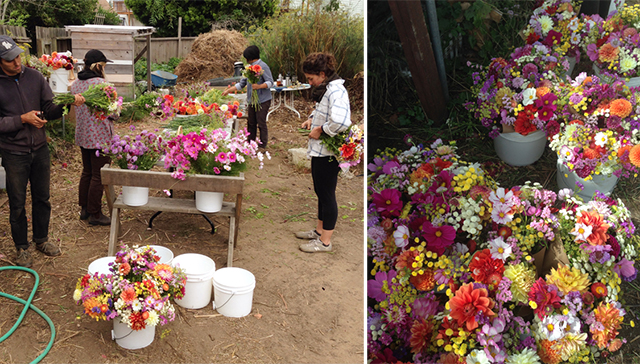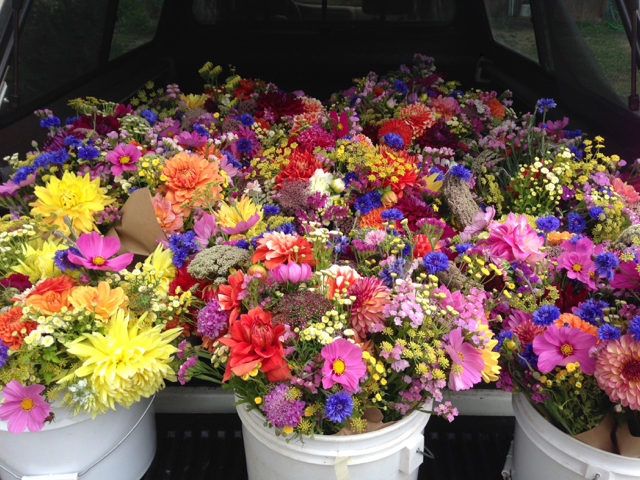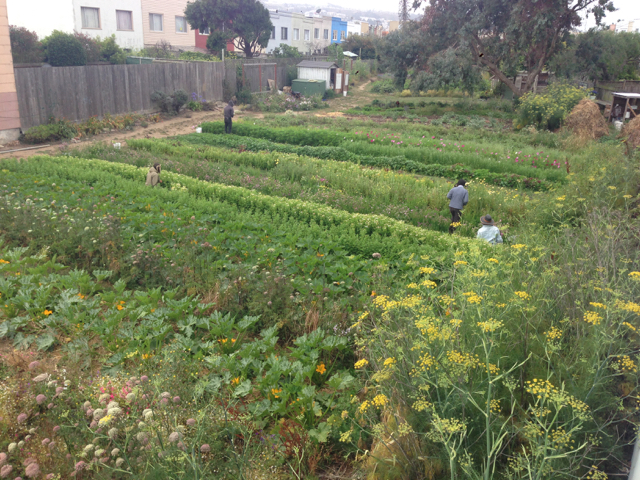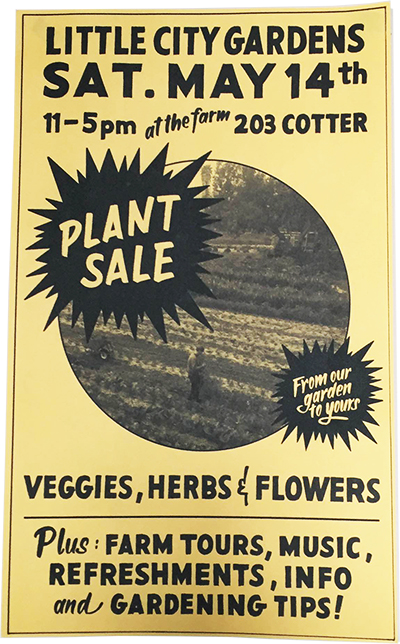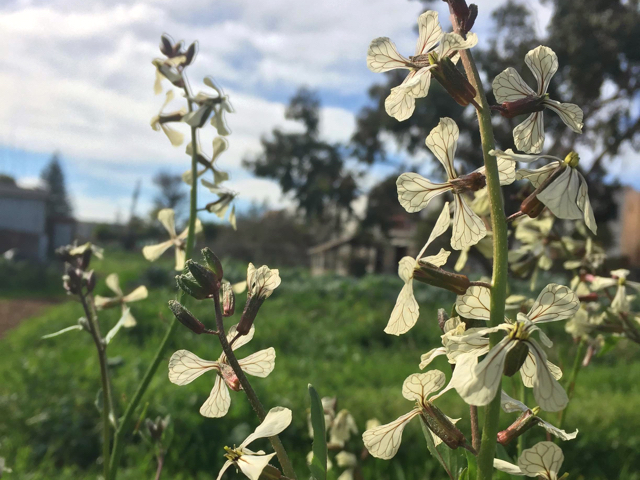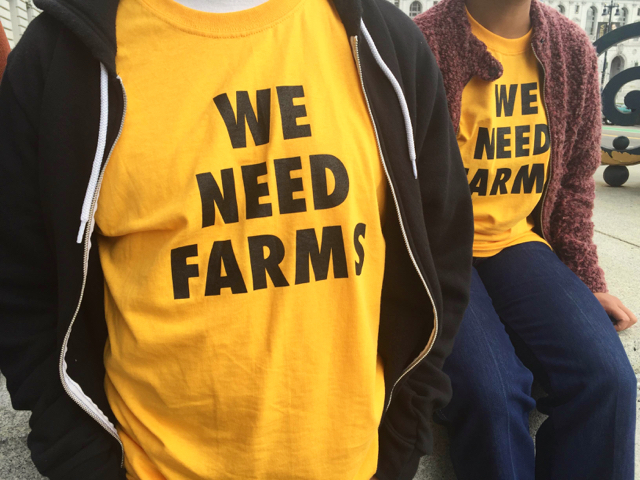
First, THANK YOU to all who wrote letters, sent words of encouragement, and came to the Planning Commission hearing on September 29th to speak about the future of the land we farm. Your comments were incredibly moving and important. While the outcome is discouraging on many levels, the outpouring of support and engagement in this complicated issue was a testament to the need for farm space in San Francisco, and a celebration of all we’ve collectively created and advocated for in the past 6.5 years. The hearing room was filled with a sea of yellow shirts, and there were so many attendees that there was an overflow room opened downstairs where people watched remotely from a television, waiting to be called upstairs to speak.
Sadly, after 3+ hours of public comment, with close to a hundred comments from neighbors, fellow farmers, and urban agriculture advocates in opposition to the development of this land, the commissioners voted 7-0 to approve (with conditions) a Conditional Use permit that allows for a deviation from zoning and the development of a 200 student school at 203 Cotter Street, one of our city’s last remaining farmable parcels.
The arguments:
The hearing was long and difficult. Parents and teachers from the school, guided by lawyers and consultants, delivered emotional arguments about the need in San Francisco for alternative models of education. There were descriptions of the warmth and love the Golden Bridges School community provides many families, coupled with amplified fears about our public school system. Parents spoke to the benefits of city children having access to the outdoors, and many parents threatened to leave the city if this development were not permitted.
Neighbors argued passionately that this site is simply inappropriate for the school’s size. Several showed photos of their flooded homes due to the inadequate sewer system in the neighborhood (see here), and argued that the scope of the school on this former creek bed would exacerbate these issues, being too densely populated for what the neighborhood’s infrastructure can handle. Traffic and safety were also repeatedly raised as major concerns for the narrow, one way street. Neighbors described the positive, low impact benefits our farm has had on the neighborhood.
Farm advocates, including Little City Gardens interns and volunteers past and present, the SF Urban Agriculture Alliance, The Garden for the Environment, community gardens and local businesses, supported neighbor concerns and urged commissioners to consider a working farm as the most appropriate and publicly beneficial use of this unique space. We spoke to the powerful experiences and educational opportunities available through a working urban farm, pointed to the ways the City has recently made commitments to urban agriculture, and reiterated the scarcity of suitable farm space in San Francisco. We argued that this property, and its current farm use, is representative of incredible momentum in the urban agriculture movement in recent years, and to change its use, build atop the soil, and close the gates to the public will be a significant loss to San Francisco. We described our past work with land trusts and public agencies around possible purchase, and we expressed confidence in our ability to resume this pursuit if given the opportunity. We also noted that the school’s values are admirable and deserve support, but reminded that while a school can find a home elsewhere in the city, a farm largely cannot.
The decision:
Many commissioners spoke of the difficulty of the decision, recognizing the situation as the complicated weighing of two policy priorities for San Francisco. Commissioners acknowledged the proven benefits of a farm, and several made clear that the scope of the proposed school campus indeed felt intense for the space and the neighborhood. Tasked with determining the necessity, desirability, and safety of the proposed use of the site, they felt mostly satisfied with the environmental impact studies included in the proposal, save a few conditions the school must adhere to moving forward. In the end, they expressed a lack of evidence for a viable alternative use, and voted to approve the proposal for fear that disapproval would pave the way for an eventual condo proposal, which they argued would be an even bigger departure from the property’s current, widely supported farm use.
Bigger picture:
To me, the outcome of the hearing, as disheartening as it is personally, indicates the sorely imperfect nature of our city’s decision making capacities, and the ways in which this particular process, like so many others, is centered around those with capital. The Planning Commission, a reactive body with limited discretionary power, responds only to proposals placed in front of them — in many cases, including this one, a proposal refined and packaged by a property owner’s professional team who are in the business of knowing what will be most palatable to commissioners. The buying power to purchase property, plus the additional resources to hire planning and public relations consultants, gives an undeniable upper hand. Capital begets momentum from the beginning to the end of this process, and the rest of the story is shaped from there.
I’m grateful that our community of neighbors and urban farming advocates were able to participate in this conversation over this piece of land that we are so invested in, but it was frustratingly clear during the hearing how squeezed our voices would be, and how much this process is swayed by the careful crafting of narrative. In this format, each commenter was free to tell their own two-minute story, which often meant the proliferation of myths that would never be fact checked. For example, several school parents dismissed neighbor concerns by saying that these same neighbors were also originally opposed to Little City Gardens, which is flatly untrue, and several told the story that Little City Gardens has been subsidized by Golden Bridges to the tune of close to $198,000 over the past two years. This is an offensively distorted and unexplained number based on, from what I gather, hypothetical rental income from a non-existent alternative $5000/month renter. (Perhaps we should have assigned a similar number to the ways Golden Bridges has directly benefited, in their formative years as an emerging urban farm school, from our active labor, and our original and continued maintenance and beautification of the land. There is a cost to maintaining a 3/4 acre parcel of land, as evidenced by the state of the site prior to our arrival, and since the time of their purchase, they have increasingly used the space and benefited from the environment we’ve maintained. What would have been the yearly salary of a school-employed farmer for the site?)
These stories were strategically included in the narrative, as was the assertion that Little City Gardens never had intentions of permanent long term use, and the reminder that we have never been the rightful owners of the property. Please let the record show that, prior to Golden Bridges’ speedy purchase:
we
had
been
trying.
Toward the end of the public comments, a school parent and prominent committee member offered some of the last words of the day. He implored the commissioners to disregard the opposition’s pleas for a continuance on this proposal (the postponement of a vote until further environmental review is conducted), stating, with a shrug, that these pleas were merely a “political tactic.” Yes, they absolutely were. Genuinely, and necessarily.
Golden Bridges leaders, I ask you to not ignore the political tactics steeped into your own narrative, to not downplay your collective position of privilege and power in this complex conversation about a rare, beloved and already activated piece of land, and to not diminish community members’ rights to oppose your plans for this property. Land use is rightfully regulated for appropriateness and public benefit. As I’ve said before, this conversation has never been an attack against Golden Bridges’ values, nor is it a personal opposition to any of the kind, well intended families or teachers within the school community. Simply put, the land that you want to build on is in a flood zone, oddly shaped, and surrounded closely by neighbors’ bedroom windows. And it is an incredibly well loved place.
What now:
The outcome of this hearing has been viewed by many as a profoundly missed opportunity by the City of San Francisco. Neighbors of 203 Cotter Street will be appealing the Conditional Use permit to the Board of Supervisors.
And for Little City Gardens, sadly, it’s time to wind down. This month, we will continue harvesting the last of our fall crops, and beginning next month we will start the heartbreaking task of packing up the farm and saying goodbye to this piece of land — home to 6.5 years of vision, experiment, dialogue and hard work. We’ve been asked to vacate 203 Cotter by December 15th.
I could never have imagined how hard it would be say goodbye to this place. Connection to land is a powerful thing, and the strong and intricate community that has formed over the years, evolving and growing with each person who passed through, has forever changed this place, I can feel it strongly. Many wonderful hands have touched this soil.
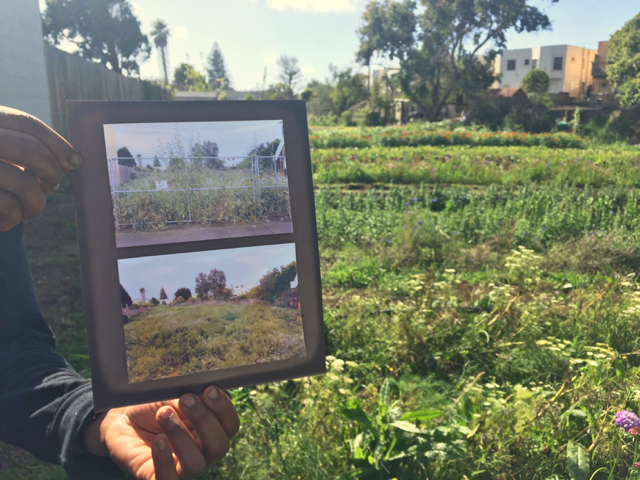
* * * * * * * * * * * * * *
“Over the years, with hard work, dedication, commitment, courage, a transformation happened. The land has become what it is now — a thriving farm space, where food is grown, where flowers bloom, and where a community is formed with neighbors, strangers, and people of disparate backgrounds. I would like to express my deepest gratitude to Little City Gardens. I had no idea, five years ago, how it would affect my life, and the impact it would have on changing my views on plants, food, people, and friendship.”
— Richard Cheung
“I fell in love with the space and people that occupied it and it truly became my home. I met a community of people that will be friends and collaborators my entire life through. Caitlyn and the land at 203 Cotter Street awakened a passion inside of me. I plan to start my own farm in the next 5 years and Little City Garden’s small-scale, intensive, organic model will always be a model I strive for. […] San Francisco is my favorite city in the world and I can say this mostly thanks to my time at Little City Gardens. Instead of feeling alone and alienated as a stranger in a big city, I felt so a part of a community right away. I grew to know the city in a way people might only dream of knowing a city. I got to know its people, its intricacies, its power and what is truly possible in an urban setting.”
— Andi Emrich
“I’ve been volunteering at Little City Gardens for over 2 years. I am a San Francisco resident for 20 years. I am not an aspiring farmer, and I don’t have a lot of knowledge about urban agriculture. I work and live in the city, and I volunteer at the farm because it’s made me into a better person.”
— Ben Grossman
“Little City Gardens has offered me the opportunity to learn and grow in the field of agriculture, while living and working in San Francisco. […] Little City Gardens has gained the neighborhood’s support and trust by example, building lasting relationships with neighbors and community.”
— Peter Woods
“Hundreds of hands have worked this soil, sifting through beds to remove rocks, broken glass, rusted metal, and the occasional action figure, making the site more apt to grow collards, kale, and onions. Shoulder-high mounds of uprooted weeds and literal tons of horse manure from Pacifica have been composted and worked into the earth, increasing soil fertility and improving the entire plot’s ability to retain water. Seasons, droughts, and summer fog have been observed, recorded, and adjusted for. Countless neighbors and wanderers have stopped to say hello, let their kid pick a gooseberry, ask what we’re doing, and talk with a fellow city-dweller.”
— Erin Klenow
“I am a farmer in Providence, RI who worked the land and learned at Little City Gardens for two years. I urge you to use this as an opportunity to declare your support for civic engagement and the empowerment of the neighbors to challenge zoning changes. I urge you to not consider green roofs a replacement for actual open space and preserve this well maintained and expertly stewarded open space. I urge you to embrace Little City Gardens as a jewel in your city and claim a mantle of leadership in protecting farmland. I urge you to be fair and engaged with all the stakeholders in this process and not just those who have the deepest pockets. Please don’t consider this farm a “vacant lot” but a neighborhood and city treasure.”
— Than Wood
“To become a part of the Little City Gardens community there are no prerequisites, and so the community it draws is one of the most diverse I have ever been a part of. Age, race, gender, and income are non-contingent identifiers for engaging with the farm. It is people of all ages and all walks of life who come to the farm with this beautiful wonder.”
— Bonnie Rose Weaver
“There is a significant lack of understanding in our society when it comes to farming and the true costs of raising our food and getting it to our table; any education that focuses only on how to grow vegetables is only a fraction of a ‘farm education’. School gardens are wonderful and valuable, but not so uncommon and difficult to build that it becomes prudent to destroy the only commercial farm in the city in order to build another one. […] Having now become one of the regular volunteers, I feel that working along side Farmer Caitlyn and crew has been a life changing experience for me, both as an aspiring farmer and as a human being. Instead of putting my farm education on hold while I worked in the city, I’ve been able to continue to gain experience and skills that build upon and surpass the other farm experiences that I’ve had. Beyond that, I’ve cultivated meaningful and valuable relationships with my beloved co-stewards, my community and with the land itself.”
— Patrice Strahan
“I am among a dedicated group of people who have invested much time and energy into the Little City Gardens out of passion for their cause—to maintain this space as the city’s only working urban farm. It has become the heart of this area, offering a peaceful, beautiful, clean space in the community, benefiting both humans and the larger ecology of the area.”
— Alice Cho
As an aspiring farmer/food provider, Caitlyn and all the other members and volunteers at Little City taught me about soil, farming techniques, and helped me develop my ice cream pop-up business, Churn Urban Creamery. It was the inspiration that I gathered from this space and these people that pushed me to start my farm-to-scoop ice cream business.
— Rica Sunga-Kwan
The opportunity to make professional connections in my field of interest, learn a trade and take positive steps on my path to improve my own skill set might not have been possible without a publicly accessible garden space where I could meet fellow urban organic agriculture practitioners.”
— Dartanian Kaufman
“As an instructor at UC Berkeley and Bard College, I value the importance and impact of schools. Yet there is already something incredibly precious that has been cultivated on this particular site, something more endangered and rarer in the city – a working farm that is interwoven into the neighborhood, into the entire city community, open to anyone who wants to stop in and take a walk or volunteer, and the proposed development would close off the space to everyone except a select private group. […] Once you pave over paradise, you can never get it back.”
— Katrina Dodson
“I realized how a farm in the middle of a city can bring people alive, help people feel connected to others in times of struggle, help people feel empowered and learn new skills, and help people think creatively about solutions to a larger agricultural and ecological system that is out of balance.”
— Brooke Budner, Little City Gardens co-founder
“Once this is built, even with the addition of grass and green roofs, there is not a farm present. I keep hearing ‘farm school’, but plant education and food preparation skills do not significantly differentiate this type of outdoor education with what is possible at many of the current models of schools with gardens throughout the city.”
— Aaron Weis, volunteer, and SFUSD teacher
“In deep relationship to landscape and people, this project compels hearts and minds to reimagine both the city and agriculture in profound ways. Little City Gardens as a working farm is a deeply relevant, responsive, and dynamic inquiry around land use in San Francisco. It has become an integral part of a resilient neighborhood fabric and national social movement.”
— Caroline Devany, former volunteer, and fellow urban farmer at Stone’s Throw Urban Farm, Minneapolis
“Urban Agriculture has a number of community benefits that go beyond just the food that is produced. These include ecosystem benefits (wildlife habitat, air quality, carbon sequestration, water management), improved quality of life (green space, community programming), social justice (access to healthy food and outdoor activity for underserved communities) and perhaps most prominently, educational opportunities.”
— Jessie Raeder, SF Urban Agriculture Alliance
“We were so happy when Little City Gardens opened on Cotter Street. This long, vacant lot became a place of beauty, open space, serenity, and an inspiration for urban agriculture.”
— Rita Gelini, neighbor
“Little City Gardens is an oasis of calm and vibrant beauty that we all need in our lives. It is a gloriously healthy heart, beating at the center of our little neighbourhood and it would be devastating to lose it entirely.”
— Rachel Perrie, neighbor and CSA member
“Over the years I have drawn inspiration from Little City Gardens to pursue my own food growing efforts.”
— Roberto Johansson, neighbor
“Little City Gardens is an active member of the San Francisco urban agriculture community, has passed groundbreaking laws, and is a support space for budding urban farmers. Little City Gardens is a national inspiration and is an asset to our City, which has always celebrated its role in the environmental movement.”
— Maggie Guerra Marks, Garden for the Environment
“My communities and I have benefitted from and enjoyed Little City Gardens over the last six and a half years. I have participated in their CSA and also in art and educational events held at the farm. I’ve learned a huge amount about farming and what it takes to sustain and nourish an urban farm.”
— Jocelyn Saidenberg, CSA member
“Little City Gardens has been a tremendous asset to our neighborhood — from sharing their bounty at a reasonable cost, to educating and providing opportunities for youth and others who might not have the means to be involved in a farm (and right in the heart of a big city!).”
— Nina Thompson, neighbor
“Part of what really has made this neighborhood great has been 203 Cotter and the open space, and Little City Gardens. It’s really banded our neighborhood together. […] They really are the heart of the neighborhood.”
— Kerry Evensong, neighbor, CSA member
* * * * * * * * * * * * * *
Above is a small selection of some of the powerful letters and public comments submitted for the hearing. A very sincere thank you to all who have contributed to these efforts, now and in the past 6.5 years. Your support, energy and passions are deeply appreciated.
